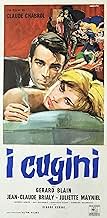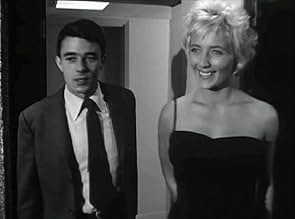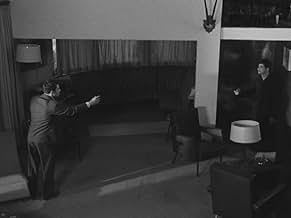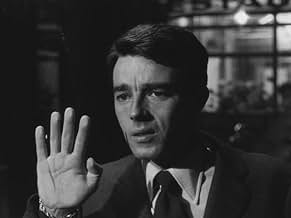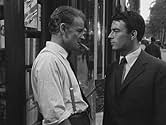AVALIAÇÃO DA IMDb
7,2/10
3,4 mil
SUA AVALIAÇÃO
Adicionar um enredo no seu idiomaA pair of cousins share a flat, but animosity begins to build between the two when a woman gets involved.A pair of cousins share a flat, but animosity begins to build between the two when a woman gets involved.A pair of cousins share a flat, but animosity begins to build between the two when a woman gets involved.
- Direção
- Roteiristas
- Artistas
- Prêmios
- 1 vitória no total
- Direção
- Roteiristas
- Elenco e equipe completos
- Produção, bilheteria e muito mais no IMDbPro
Avaliações em destaque
This film by Claude Chabrol reminds me of the old story of the country mouse and the city mouse. The country mouse is excited to see the big city but his bumbling provincial ways are out of step with his more sophisticated city cousin. This seems to be pretty much the basis for this film, "Les Cousins"! Though of course, being a Chabrol film it will have some dark edges and twists!
Charles is the guy raised in the country. He's slow and lacks confidence with women. Paul, on the other hand, was raised in the city and women hang all over him and put out like crazy for him. When Charles comes to stay with him while he goes to college, he is quite the contrast to Paul who is a confident ladies' man. He's also more bookish and introspective than Paul. All Paul wants is to have a good time and have sex--and he couldn't care less about his studies at the college. And, in a way, Paul has contempt for his cousin when Charles falls head over heels for Florence--and he soon beds Florence and asks her to move in with him. As for Charles, he is sad but sinks his energy into his classwork and tries to do the right thing. What's next for this odd mismatched pair? Bet you won't be able to guess!
This film is considered by many to be one of the best and earliest New Wave films. Like many New Wave movies, the normal film formulas are turned on their head and goodness isn't necessarily rewarded and the ending is quite ambiguous. Well worth seeing and darkly enjoyable.
Charles is the guy raised in the country. He's slow and lacks confidence with women. Paul, on the other hand, was raised in the city and women hang all over him and put out like crazy for him. When Charles comes to stay with him while he goes to college, he is quite the contrast to Paul who is a confident ladies' man. He's also more bookish and introspective than Paul. All Paul wants is to have a good time and have sex--and he couldn't care less about his studies at the college. And, in a way, Paul has contempt for his cousin when Charles falls head over heels for Florence--and he soon beds Florence and asks her to move in with him. As for Charles, he is sad but sinks his energy into his classwork and tries to do the right thing. What's next for this odd mismatched pair? Bet you won't be able to guess!
This film is considered by many to be one of the best and earliest New Wave films. Like many New Wave movies, the normal film formulas are turned on their head and goodness isn't necessarily rewarded and the ending is quite ambiguous. Well worth seeing and darkly enjoyable.
Chabrol's second feature. I haven't seen his first, Le beau Serge, but this is the most French New Wave film I've seen from Chabrol. As such, it's by far my favorite. I like several of his films, but I do find even my favorites a little dry. This one is just gorgeous and it's quite a lot of fun throughout. Gerard Blain plays a provincial who is moving to Paris to go to college. He moves in with his cousin (Jean-Claude Brialy), who is himself a student. Brialy is a total party animal, spending all his free time drinking with friends and none of it studying. The two get along at first, but then a woman (Juliette Mayniel) comes between them. The film is kind of a precursor to Jules et Jim.
The 13th film I saw of Claude Chabrol. The least I liked. I understand the meaning and the message of the film, but practically nothing captivated me: Neither the characters (nor Charles's own character captivated me) nor the rhythm of the film (a very long sequence in which we get to know Paul's friends, who swim and the way the "bourgeoisie" is presented to us, there are immense films that "capture" this social class in a much more skilful and humorous way, nor the message of the film, which I find to be inadequate and unlikely in the form how it is performed. I liked Chabrol's film the previous year, his first one, "le beau serge", curiously with the same double protagonist. I can not give this "les cousins" more than 6/10.
Although it's Chabrol's second effort (the first one being "le beau serge" featuring the same actors),this one is closer to Chabrol-as -we -know-him.The detective ending and the first steps in the bourgeois world of Brialy character herald Chabrol 's heyday (which begins with "les biches" ,encompasses such works as "la femme infidèle","que la bête meure" "le boucher" "la rupture" "juste avant la nuit " and ends with" les noces rouges";that's not to say all the movies were great during that period :"doctor Popaul" and "la decade prodigieuse" can be forgotten";that does not mean there were no great works after "wedding in blood" (les noces)either as testify such memorable works as "Violette NOzières","Une affaire de femmes" or "l'enfer".But in France the 1967-1973 era is generally regarded as Chabrol's peak ,with "le boucher" ,his towering achievement. So we enter the bourgeois world with Brialy's character,a bon vivant as we say in France,with parents (whom we never see)who provide him money and a comfortable flat .He is a student,but we never see him studying,girls and pleasures taking the best of him. In direct contrast with him,enters Blain,his provincial cousin.He comes from a much more modest background,his parents (whom we never see either)had certainly to struggle hard to send him to the Latin Quarter. So from the beginning ,the incommunicability is total.Blain is a grind,and if sometimes he accepts to follow his life-lover cousin in not-so-intellectual places in Paris,he knows he shall not disappoint his old parents.Brialy's kind of life is bewildering for a young lad like Blain:a scene is particularly strange,baroque,and even threatening: some fascination for Nazism from Brialy and his clique during a strange party(it's 1959,and German occupation is not that much far behind after all). Chabrol has ready begun his bourgeoisie wholesale massacre:Brialy is the prototype of the bourgeois student,selfish and smug,self-confident and apolitical (And however,1959,it's Algerian war!Young French are sent to do the dirty job).Apolitical,such is also Blain's case,but with more excuses :after all,when you're poor .. In his autobiography "le ruisseau des singes" ,Brialy told that Chabrol(and the producer) had planned an happy end with the two cousins running across the fields,reconciled.Both endings were filmed,and finally the two actors urged Chabrol to renounce this silly conclusion. Hence an almost Hitchcockian ending,Hitchcock whose influence will grow over the years in Chabrol's work.
The naive mama's boy Charles (Gérard Blain) moves to Paris to live with his debauched bon-vivant cousin Paul Thomas (Jean-Claude Brialy) in his apartment. He meets Paul's friend, the pervert pimp Jean "Clovis", who is older than them. Paul studies hard and writes daily to his mother while Paul gives frequent parties and neither studies nor goes to lectures. When Charles meets Paul's friend, the gorgeous and promiscuous Florence (Juliette Mayniel), he falls in love with her. They talk later through telephone and Florence understands the invitation of Charlie to meet her wrongly and arrives earlier at his apartment. She meets the cynical Paul and Clovis that tell her that she is a slut and will cheat Charlie when she becomes bored with him, and she ends having sex with Paul. Florence moves to the apartment to live with Paul, disturbing the attention of Charlie in his studies. When the final exams come, there is a tragedy.
"Les cousins" (1959) is the second film directed by Claude Chabrol, with the story of two cousins and depicting an empty generation. One cousin is from the countryside, naive, shy and mama's boy; the other is popular and pervert, although protecting his cousin most of the time. The beautiful Juliette Mayniel performs a key element in the story, since Charles has a crush on her, but Paul destroys their relationship since the twenty-year-old woman is promiscuous and has slept with most of his friends. However, the concentration of Charles is lost, and he fails his exam. The tragic conclusion is very sad. My vote is seven.
Title (Brazil): "Os Primos" ("The Cousins")
"Les cousins" (1959) is the second film directed by Claude Chabrol, with the story of two cousins and depicting an empty generation. One cousin is from the countryside, naive, shy and mama's boy; the other is popular and pervert, although protecting his cousin most of the time. The beautiful Juliette Mayniel performs a key element in the story, since Charles has a crush on her, but Paul destroys their relationship since the twenty-year-old woman is promiscuous and has slept with most of his friends. However, the concentration of Charles is lost, and he fails his exam. The tragic conclusion is very sad. My vote is seven.
Title (Brazil): "Os Primos" ("The Cousins")
Você sabia?
- CuriosidadesTwo endings were filmed, one optimistic (the reconciliation between the two cousins), which was discarded, and the other pessimistic, which was finally chosen.
- Citações
Le libraire: Read Dostoyevsky. He addresses all your concerns.
- ConexõesFeatured in Fejezetek a film történetéböl: A francia új hullám (1990)
- Trilhas sonoras40e Symphonie en Sol Majeur (Koechel 550) 1er movement
Music by Wolfgang Amadeus Mozart (as W.A. Mozart)
Performed by London Symphony Orchestra (as Orchestre Symphonique de Londres)
Conducted by Josef Krips (as Joseph Krips)
Disque DECCA
Principais escolhas
Faça login para avaliar e ver a lista de recomendações personalizadas
- How long is The Cousins?Fornecido pela Alexa
Detalhes
Bilheteria
- Orçamento
- FRF 6.000.000 (estimativa)
- Tempo de duração1 hora 52 minutos
- Cor
- Mixagem de som
- Proporção
- 1.37 : 1
Contribua para esta página
Sugerir uma alteração ou adicionar conteúdo ausente


